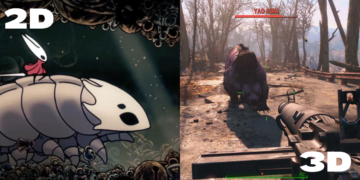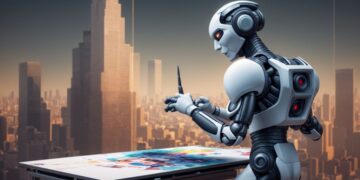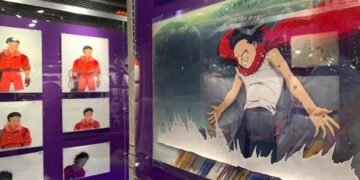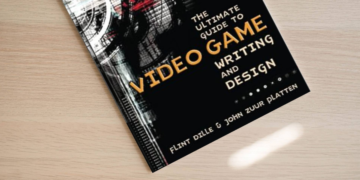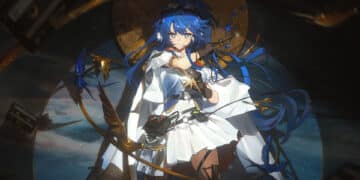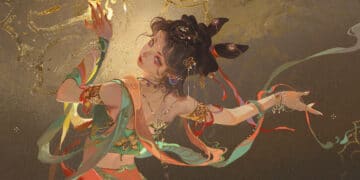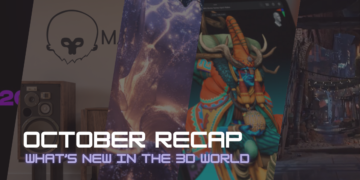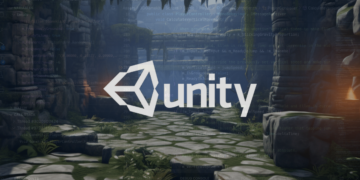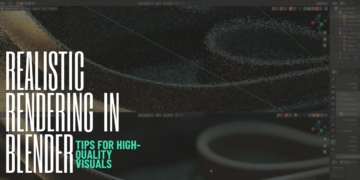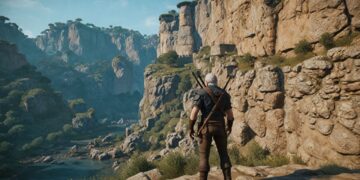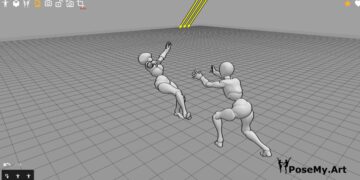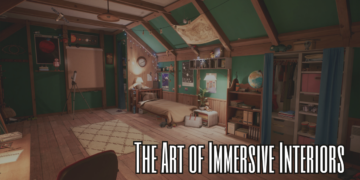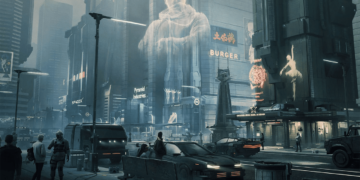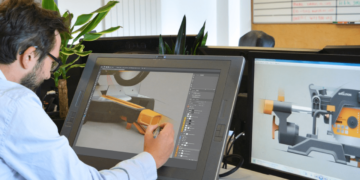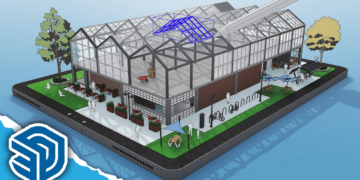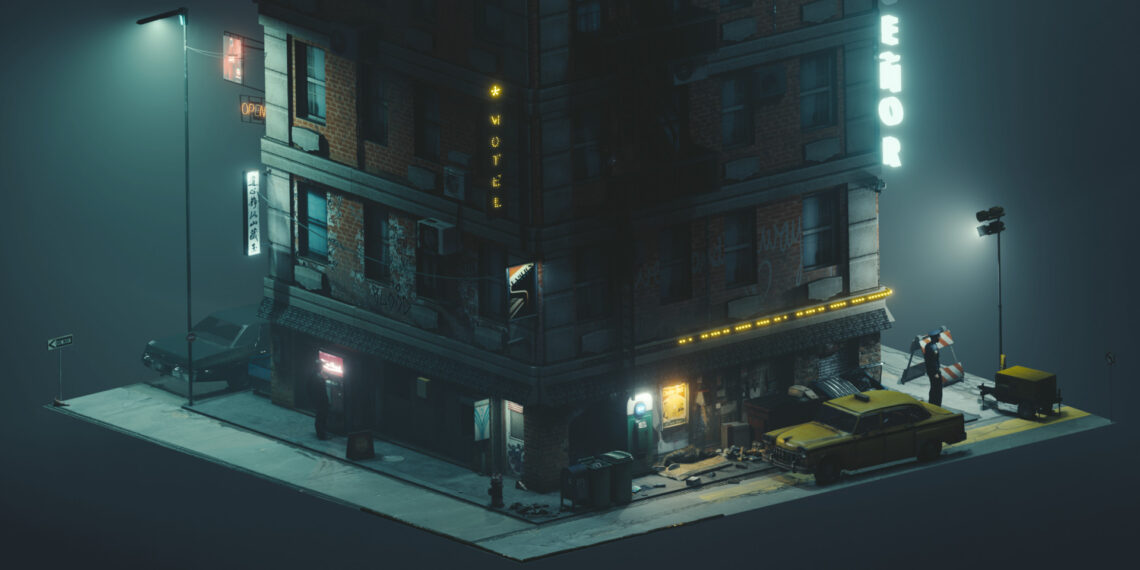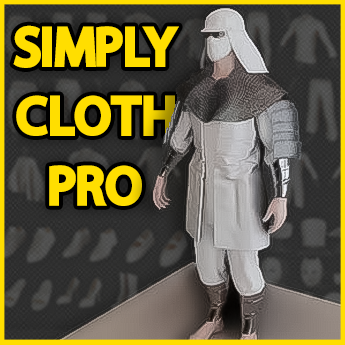Choosing Blender for game development almost seems like the most intuitive idea, right? Video game development is a long process that requires skills and experience, in order to do a good job of creating video games that people love and enjoy. Game development also requires software that developers and artists need to get their job done, so is Blender really good when it comes to creating video games?
How can you use Blender for game development?
We can divide video game development into two parts: asset creation and assembling those assets in a game engine generally speaking.
Asset creation involves Modeling, Sculpting, UV unwrapping, Baking, Texturing, Rigging, and Animation.
1 – Modeling

Modeling is probably one of the most time-consuming parts of creating video games, and Blender is very good at it. Using Blender for game development, you can create characters and environments which of course contain a lot of props. Blender has a lot of modifiers which are automatic operations that affect objects in a non-destructive way to gain time. In addition to making the modeling process easier and more efficient.
Modeling for video games is kind of different from modeling for any other type of production. Because you need to take hardware processing power into account ahead of time. I mean we need to respect the limited processing power of game consoles or the average computers that will run these games. That’s why we need to create low-poly versions of the highly detailed models to allow us to run our video game smoothly in real-time.
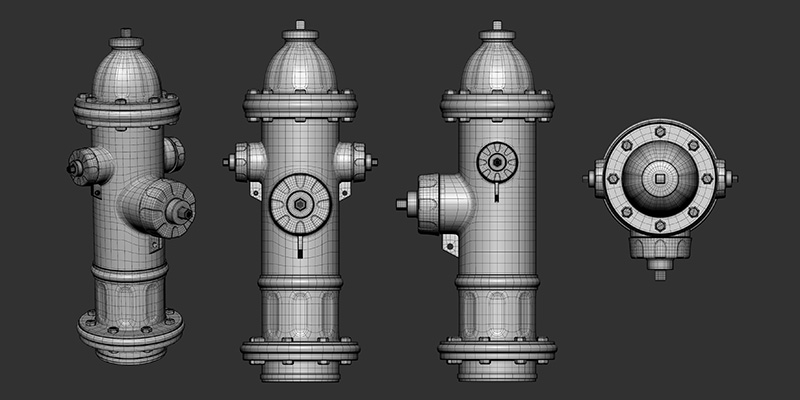
Using Blender for game development, you can model a lower poly version based on the high-poly model you created. And you will be able to make the low-poly look like the polished high-poly version using special maps that you can create through a final process. To clarify, we call it “Baking” and we will talk about it further in this article.
Blender has a lot of cool modeling addons that have been ported to the new versions, and it will allow you to take your modeling game to the next level. Among these are Boxcutter, Hardops, and Meshmashine.
2 – Sculpting
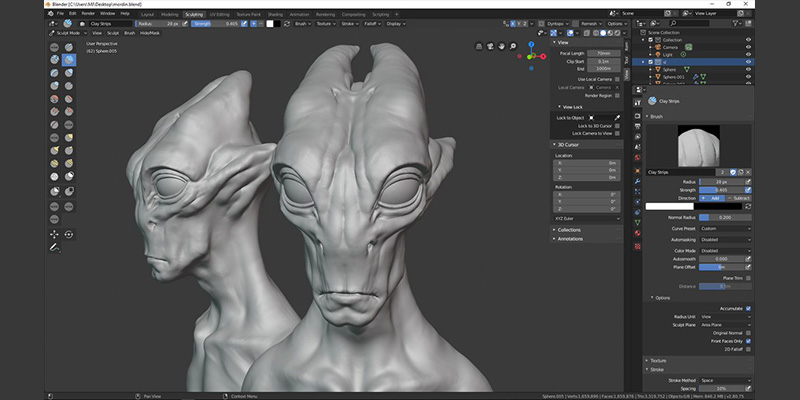
Sometimes we need sculpting to create more details in our high-poly models, especially characters.
Characters are better created using sculpting from the start, because it is more intuitive and gives more freedom. Since creating a character is more complicated in terms of modeling compared to environment props. Even though sculpting in Blender is not as advanced as Zbrush (which is the industry standard for sculpting), it is able to sculpt very well and you can generate interesting results. Not to mention that Bledermarket is filled with awesome Blender addons for sculpting that can enhance the process sensibly. We made a selection in a detailed previous post, feel free to check by clicking here.
3 – UV Unwrapping
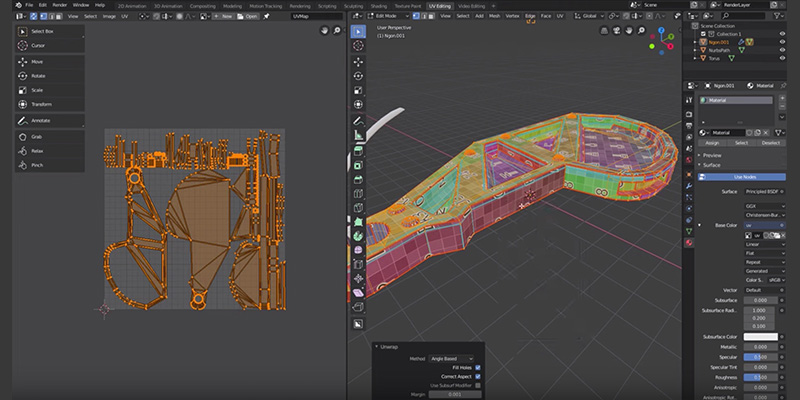
UV unwrapping is a very important part of creating game ready assets, because a lot of processes that come later will rely on it. If it is done well, you will get nice results and if it is done poorly you will get bad results.
Using Blender for development will help on this point, because it’s very good when it comes to creating UVs for video game assets. You can unwrap anything you want, like characters or props using Blender’s unwrapping tools. You can also use some great Blender UV unwrapping and UV packing addons that will speed up the process. Because it can become boring and highly repetitive very easily, also it consumes a lot of time and effort.
4 – Baking Maps
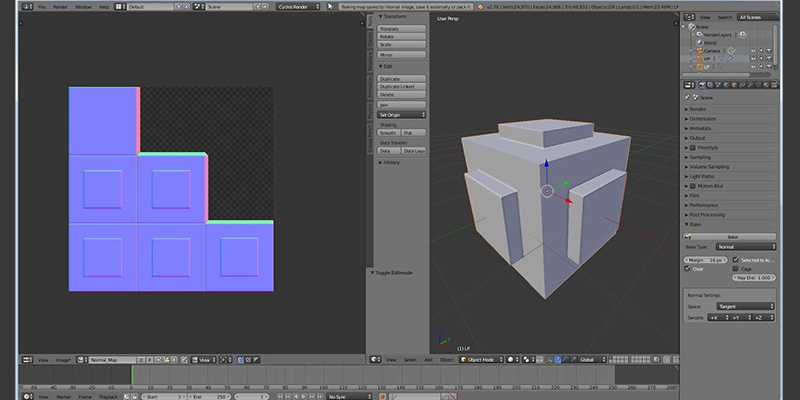
In maps baking, especially normals baking the mesh normals (which affect how light appears to reflect from the model’s surface) can be recorded. As a result, you’ll get very specialized images with RGB values based on normal vectors.
Baking requires having the model UV-unwrapped, so the resulting image is properly fit to the model. In order to perform the baking properly for game-ready assets, you need the high-poly version and the low-poly version placed exactly in the same position in space if we want to have a perfect bake.
Choosing Blender for game development, you can do this just fine. However, this process is usually outsourced to another application like Substance Painter (which is an industry-standard for baking and texturing game ready models).
5 – Texturing
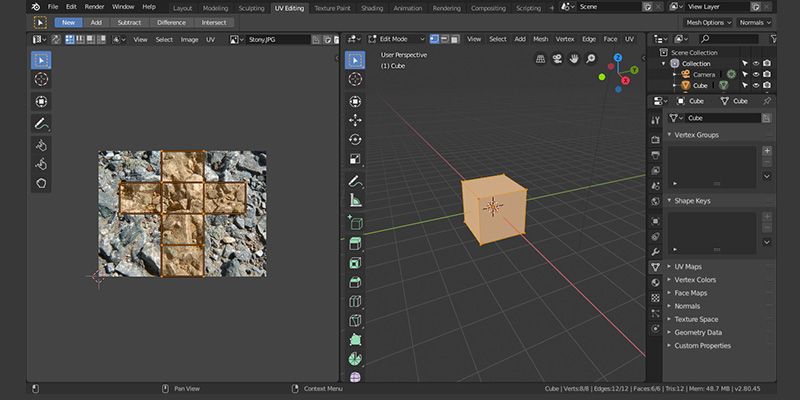
Creating textures for characters and props in the environment is a very important part of the entire process. Because doing a good job here is going to amplify the results we got in previous stages. On the other hand, doing a poor job is going to make things look worse overall.
Again: choosing Blender for game development, you can create very good textures for your assets by painting directly on the mesh. Or by using external textures that you can apply on your models. There’s also tons of amazing Blender addons for texturing and shading on the market.
Furthermore, Blender has a real-time renderer which allows you to see your textures in real-time applied on your model or an entire scene for that matter. In addition to the powerful render engine Cycles, and plenty of awesome Blender addons for rendering and lighting.
6 – Rigging and Animation
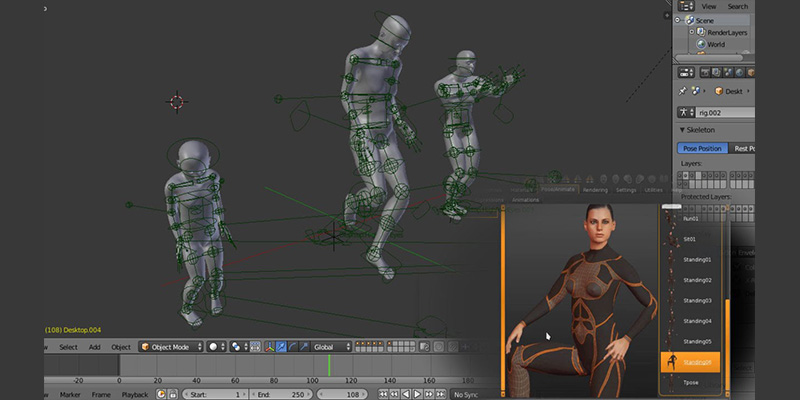
When it comes to rigging and animation, Blender can do an excellent job. Because it has all the tools necessary for rigging characters and doing character animation. Actually, several short films were created with Blender.
Using Blender for game development, you can create animations for characters or anything else that needs to be animated, then you will export those animations to a game engine.
This leads us to the second part of creating a video game that is exporting the assets we created in Blender into a game engine. Blender used to have an actively developed game engine. But due to some problems that developers faced with the Blender game engine, they abandoned it to focus on creating and developing more features. Also one of the reasons that made the Blender engine less popular even among Blender users is the fact that there are other free to use for commercial purposes and powerful game engines like Unity and Unreal engine.
There are actually a lot of indie developers and small video game studios using Blender for game development. And this means that what Blender has to offer is sufficient to get the job done.
Also one of the reasons why indie developers use Blender is because it is free and open-source. Which means they don’t have to spend money on licenses that can add up to tens of thousands of dollars if you have a small team. This is simply an extra expense for small developers that they cannot afford, so Blender is a great option for them plus it can do a great job so why not.
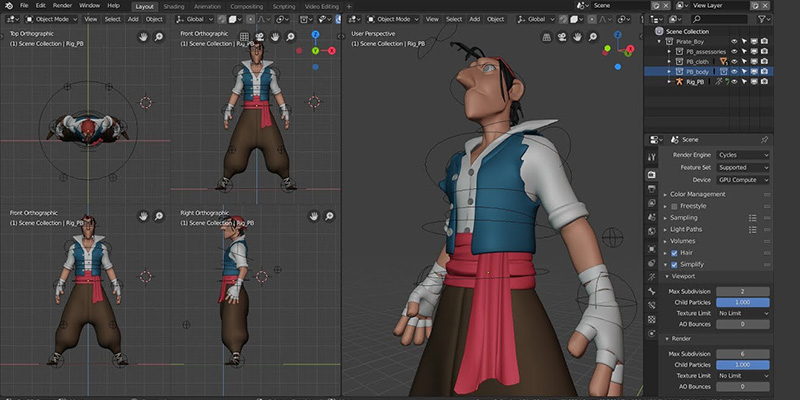
In addition to that, Blender is open-source, which means you can create your own tools if you see that this is going to help you get things done better or faster. Above all, you can create something custom-tailored to your specific needs.
In recent years (especially with the Blender 2.8 release and beyond), medium size studios are starting to use Blender even though it is limited to a certain extent. I mean they use it to work on some part of the production, because there are artists in the studio that prefer to use Blender or because Blender is better or faster at that particular job.
Recently, studios are using Blender to work on game cinematics or to create characters. Which shows that it is being regarded as an important tool for game development.
But Blender at this point is not used when it comes to AAA video game development studios, meaning it is not industry standard yet. Because this might take few years depending on what direction Blender foundation wants to take from now on.
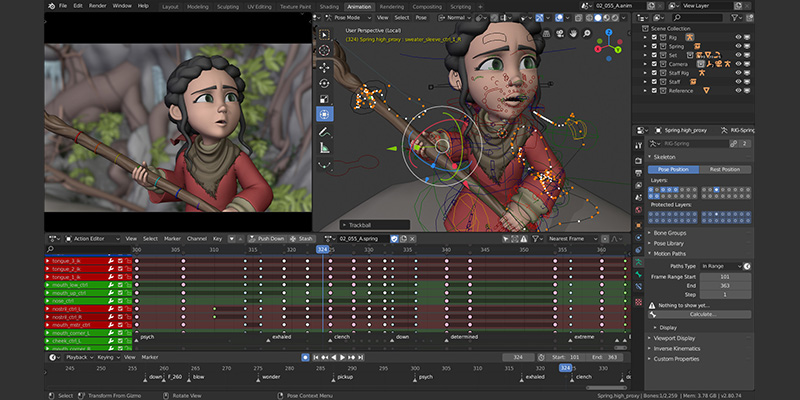
Big studios use different software other than Blender, this will lead us the question: how can you work in AAA video game studio if you are a Blender user? I think if you are new to game development and 3D, in general, you can use Blender if you are interested in it. Because using it, you can go through all the necessary processes of creating game-ready assets. After that, when you become good enough to be hired to work in AAA video game development studio, you can use an industry-standard software like Maya or 3ds Max to be able to work in the industry
This does not mean that you wasted time learning Blender. Because, for the most part, the skills of a game development artist can transferred quickly across different software. Meaning you can learn other 3D packages like 3ds Max or Maya in few months compared to the years needed learning Blender. In other words, you have become experienced with game development concepts and it is just a matter of getting used to the tools.

